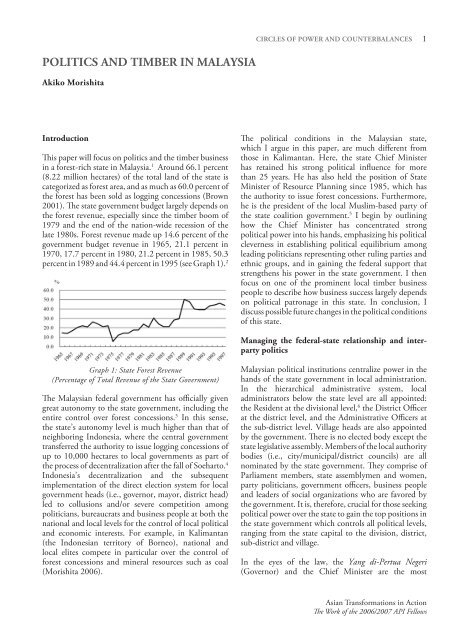Asian Transformations in Action - Api-fellowships.org
Asian Transformations in Action - Api-fellowships.org
Asian Transformations in Action - Api-fellowships.org
Create successful ePaper yourself
Turn your PDF publications into a flip-book with our unique Google optimized e-Paper software.
CIRCLES OF POWER AND COUNTERBALANCES 1POLITICS AND TIMBER IN MALAYSIAAkiko MorishitaIntroductionThis paper will focus on politics and the timber bus<strong>in</strong>ess<strong>in</strong> a forest-rich state <strong>in</strong> Malaysia. 1 Around 66.1 percent(8.22 million hectares) of the total land of the state iscategorized as forest area, and as much as 60.0 percent ofthe forest has been sold as logg<strong>in</strong>g concessions (Brown2001). The state government budget largely depends onthe forest revenue, especially s<strong>in</strong>ce the timber boom of1979 and the end of the nation-wide recession of thelate 1980s. Forest revenue made up 14.6 percent of thegovernment budget revenue <strong>in</strong> 1965, 21.1 percent <strong>in</strong>1970, 17.7 percent <strong>in</strong> 1980, 21.2 percent <strong>in</strong> 1985, 50.3percent <strong>in</strong> 1989 and 44.4 percent <strong>in</strong> 1995 (see Graph 1). 2The political conditions <strong>in</strong> the Malaysian state,which I argue <strong>in</strong> this paper, are much different fromthose <strong>in</strong> Kalimantan. Here, the state Chief M<strong>in</strong>isterhas reta<strong>in</strong>ed his strong political <strong>in</strong>fluence for morethan 25 years. He has also held the position of StateM<strong>in</strong>ister of Resource Plann<strong>in</strong>g s<strong>in</strong>ce 1985, which hasthe authority to issue forest concessions. Furthermore,he is the president of the local Muslim-based party ofthe state coalition government. 5 I beg<strong>in</strong> by outl<strong>in</strong><strong>in</strong>ghow the Chief M<strong>in</strong>ister has concentrated strongpolitical power <strong>in</strong>to his hands, emphasiz<strong>in</strong>g his politicalcleverness <strong>in</strong> establish<strong>in</strong>g political equilibrium amonglead<strong>in</strong>g politicians represent<strong>in</strong>g other rul<strong>in</strong>g parties andethnic groups, and <strong>in</strong> ga<strong>in</strong><strong>in</strong>g the federal support thatstrengthens his power <strong>in</strong> the state government. I thenfocus on one of the prom<strong>in</strong>ent local timber bus<strong>in</strong>esspeople to describe how bus<strong>in</strong>ess success largely dependson political patronage <strong>in</strong> this state. In conclusion, Idiscuss possible future changes <strong>in</strong> the political conditionsof this state.Manag<strong>in</strong>g the federal-state relationship and <strong>in</strong>terpartypoliticsGraph 1: State Forest Revenue(Percentage of Total Revenue of the State Government)The Malaysian federal government has officially givengreat autonomy to the state government, <strong>in</strong>clud<strong>in</strong>g theentire control over forest concessions. 3 In this sense,the state’s autonomy level is much higher than that ofneighbor<strong>in</strong>g Indonesia, where the central governmenttransferred the authority to issue logg<strong>in</strong>g concessions ofup to 10,000 hectares to local governments as part ofthe process of decentralization after the fall of Soeharto. 4Indonesia’s decentralization and the subsequentimplementation of the direct election system for localgovernment heads (i.e., governor, mayor, district head)led to collusions and/or severe competition amongpoliticians, bureaucrats and bus<strong>in</strong>ess people at both thenational and local levels for the control of local politicaland economic <strong>in</strong>terests. For example, <strong>in</strong> Kalimantan(the Indonesian territory of Borneo), national andlocal elites compete <strong>in</strong> particular over the control offorest concessions and m<strong>in</strong>eral resources such as coal(Morishita 2006).Malaysian political <strong>in</strong>stitutions centralize power <strong>in</strong> thehands of the state government <strong>in</strong> local adm<strong>in</strong>istration.In the hierarchical adm<strong>in</strong>istrative system, localadm<strong>in</strong>istrators below the state level are all appo<strong>in</strong>ted:the Resident at the divisional level, 6 the District Officerat the district level, and the Adm<strong>in</strong>istrative Officers atthe sub-district level. Village heads are also appo<strong>in</strong>tedby the government. There is no elected body except thestate legislative assembly. Members of the local authoritybodies (i.e., city/municipal/district councils) are allnom<strong>in</strong>ated by the state government. They comprise ofParliament members, state assemblymen and women,party politicians, government officers, bus<strong>in</strong>ess peopleand leaders of social <strong>org</strong>anizations who are favored bythe government. It is, therefore, crucial for those seek<strong>in</strong>gpolitical power over the state to ga<strong>in</strong> the top positions <strong>in</strong>the state government which controls all political levels,rang<strong>in</strong>g from the state capital to the division, district,sub-district and village.In the eyes of the law, the Yang di-Pertua Negeri(Governor) and the Chief M<strong>in</strong>ister are the most<strong>Asian</strong> <strong>Transformations</strong> <strong>in</strong> <strong>Action</strong>The Work of the 2006/2007 API Fellows
















